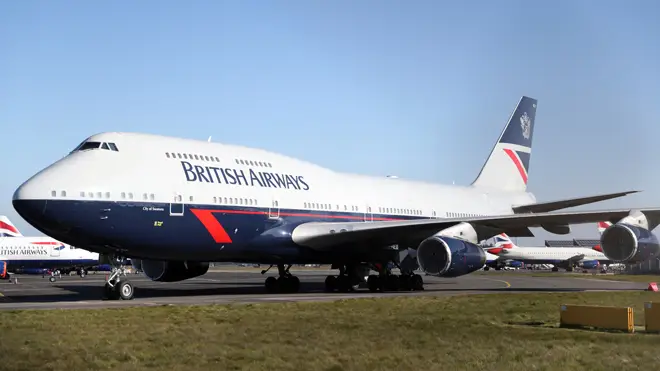
Clive Bull 1am - 4am
17 July 2020, 06:36

Declining travel due to pandemic forces British Airways to retire Boeing 747s
British Airways is to retire its fleet of Boeing 747s with immediate effect due to the effects of the covid-19 crisis.
The airline has used the craft since July 1989 and is currently the world's biggest operator of the 747-400 model.
It was planning to retire the fleet of 31 craft in 2024 but its end has been hastened by coronavirus.
The company said: "It is with great sadness that we can confirm we are proposing to retire our entire 747 fleet with immediate effect.

Listen & subscribe: Global Player | Apple Podcasts | Google Podcasts | Spotify
"It is unlikely our magnificent 'queen of the skies' will ever operate commercial services for British Airways again due to the downturn in travel caused by the Covid-19 global pandemic.
"While the aircraft will always have a special place in our heart, as we head into the future we will be operating more flights on modern, fuel-efficient aircraft such as our new A350s and 787s, to help us achieve net-zero carbon emissions by 2050."
British Airways operated the plane, powered to a top speed of 614mph by four Rolls Royce engines, to destinations in China, the US, Canada and Africa.
UK airlines have struggled to cope with the collapse in demand caused by the coronavirus crisis, with easyJet, British Airways and Virgin Atlantic all announcing job cuts and reduced operations.
Meanwhile, demand for air travel will take longer to return to pre-pandemic levels than initially expected, according to the latest industry forecast.
Trade body ACI Europe, which represents European airports, said it does not expect passenger numbers to recover until 2024, one year later than it predicted in May.
This comes after figures for June show the increase in air travel following the easing of coronavirus restrictions has been slower than anticipated.
Passenger traffic across European airports last month was down 93% compared with June 2019.
This was an improvement on the 98% year-on-year decline recorded in May, but highlights how far the industry has to go to recover from the pandemic.